Related Research Articles

3,4-Methylenedioxyamphetamine (MDA), sometimes referred to as sass, is an empathogen-entactogen, stimulant, and psychedelic drug of the amphetamine family that is encountered mainly as a recreational drug. In its pharmacology, MDA is a serotonin–norepinephrine–dopamine releasing agent (SNDRA). In most countries, the drug is a controlled substance and its possession and sale are illegal.
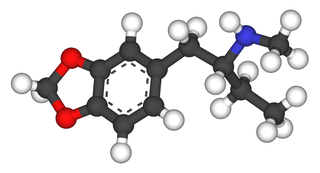
MBDB, also known as N-methyl-1,3-benzodioxolylbutanamine or as 3,4-methylenedioxy-N-methyl-α-ethylphenylethylamine, is an entactogen of the phenethylamine, amphetamine, and phenylisobutylamine families related to MDMA. It is known by the street names "Eden" and "Methyl-J".
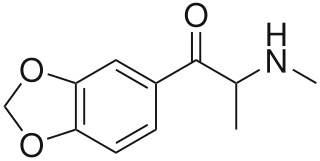
Methylone, also known as 3,4-methylenedioxy-N-methylcathinone (MDMC), is an entactogen and stimulant drug of the amphetamine, cathinone, and benzodioxole families related to 3,4-methylenedioxymethamphetamine. It is the β-keto or cathinone analogue of MDMA. Methylone is usually taken orally, but is also used by other routes.
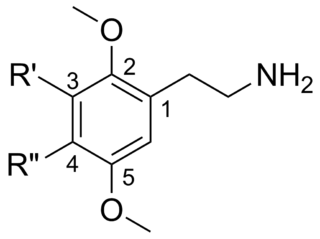
2C (2C-x) is a general name for the family of psychedelic phenethylamines containing methoxy groups on the 2 and 5 positions of a benzene ring. Most of these compounds also carry lipophilic substituents at the 4 position, usually resulting in more potent and more metabolically stable and longer acting compounds.

The substituted methylenedioxyphenethylamines represent a diverse chemical class of compounds derived from phenethylamines. This category encompasses numerous psychoactive substances with entactogenic, psychedelic, and/or stimulant properties, in addition to entheogens. These compounds find application as research chemicals, designer drugs, and recreational substances.

MDAI, also known as 5,6-methylenedioxy-2-aminoindane, is an entactogen drug of the 2-aminoindane group which is related to MDMA and produces similar subjective effects.
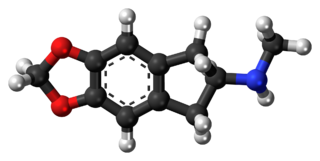
5,6-Methylenedioxy-N-methyl-2-aminoindane (MDMAI), is a drug of the 2-aminoindane group developed in the 1990s by a team led by David E. Nichols at Purdue University. It acts as a non-neurotoxic and highly selective serotonin releasing agent (SSRA) in animals and a putative entactogen in humans.
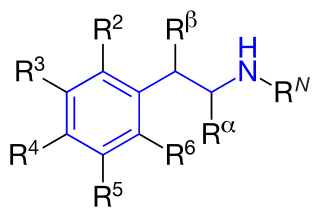
Substituted phenethylamines are a chemical class of organic compounds that are based upon the phenethylamine structure; the class is composed of all the derivative compounds of phenethylamine which can be formed by replacing, or substituting, one or more hydrogen atoms in the phenethylamine core structure with substituents. Phenylethylamines are also generally found to be central nervous system stimulants with many also being entactogens/empathogens, and hallucinogens.

5-MAPBT (5-methylaminopropylbenzothiophene) is an empathogenic drug of the benzothiophene group. It is closely related to 5-MAPB but with the oxygen atom replaced by sulfur, changing the core ring structure to benzothiophene rather than benzofuran.
LPH-48 is a selective serotonin 5-HT2A receptor agonist and psychedelic hallucinogen which is under development for the treatment of alcoholism. Its route of administration has not been specified.
MYCO-005 is a serotonin 5-HT2A receptor agonist and psychedelic hallucinogen which is under development for the treatment of depressive disorders and anxiety disorders.
CYB005, or CYB-005, also known as deuterated phenethylamine derivative, is a serotonin receptor agonist and serotonergic psychedelic which is under development for use at non-hallucinogenic doses in the treatment of psychiatric disorders and neuroinflammation.

α-Methylisotryptamine is a synthetic compound belonging to the tryptamine class, known for its psychoactive properties. As a structural analog of α-methyltryptamine (αMT), isoAMT exhibits entactogenic and psychedelic effects.
Tactogen is a public benefit corporation and start-up pharmaceutical company based in Palo Alto, California that is developing novel MDMA-like entactogens and psychedelics as medicines. Its stated goal is to develop new MDMA-like drugs with improved effectiveness, tolerability, and safety, as well as gentleness and accessibility, for treatment of psychiatric disorders and other conditions. Tactogen was co-founded by neuroscientist Matthew J. Baggott and Luke Pustejovsky in 2020. Baggott is the chief executive officer (CEO) while Pustejovsky is the chief operating officer (COO).

TACT908, also known as [2-(indolizin-1-yl)ethyl]dimethylamine (2ZEDMA), is a serotonin receptor agonist which is under development for the treatment of cluster headaches. It is an analogue and positional isomer of the tryptamine serotonergic psychedelic N,N-dimethyltryptamine (DMT) in which the indole ring has been replaced with an indolizine ring.
MYCO-002 is an MDMA-like entactogen that is under development for the treatment of psychiatric disorders. It is said to be being developed towards the aim of improving the safety profile of MDMA. The drug is under development by Mydecine. It was patented in July 2021 and received breakthrough therapy designation from the Food and Drug Administration (FDA) in November 2021. As of November 2021, MYCO-002 is in the preclinical research for treatment of psychiatric disorders. The chemical structure of MYCO-002 does not yet appear to have been disclosed.
Mydecine Innovations Group, or simply Mydecine, is an American and Canadian pharmaceutical company that is developing psychedelics and entactogens as medicines.
MYCO-006 is an MDMA-like entactogen that is under development for the treatment of psychiatric disorders. It is a short-acting and fast-onset MDMA analogue. Based on animal studies, it is predicted that MYCO-006 will have a duration of 1 to 2 hours, about one-third the 6- to 8-hour duration of MDMA, and to onset 4 times as fast as MDMA. MYCO-006 is being developed by Mydecine. As of February 2024, it is in preclinical research. The chemical structure of MYCO-006 does not yet appear to have been disclosed. However, MYCO-006 is said to be a benzodioxole like MDMA. 5-BZT-MDMA (MY100) and 6-BZT-MDMA (MY101) were described in Mydecine's patent for short-acting MDMA analogues.
MYCO-004 is a patch-delivered psychedelic tryptamine which is under development for the treatment of psychiatric disorders. It is anticipated to allow for precision dosing and to have a short duration of approximately 2 hours. The drug is being developed by Mydecine. As of December 2021, it is in preclinical research for psychiatric disorders. The exact chemical structure of MYCO-004 does not yet seem to have been disclosed.
References
- 1 2 3 4 "Delving into the Latest Updates on MYCO-007 with Synapse". synapse.patsnap.com.
- 1 2 "Prospectus Supplement" (PDF). Mydecine Innovations Group Inc. 15 September 2023. Retrieved 23 October 2024.
MYCO - 006 and 007 represent families of molecules that are based on MDMA molecules. MYCO -006 and MYCO – 007 have been developed in order to reduce the overall acute experience time of Generation 1 MDMA by increasing the metabolism properties of the drug.
- ↑ Mydecine Innovations Group (19 July 2022). "Mydecine Files Full Patent Application Covering MYCO-006 Family of Novel Short-Acting MDMA Analogs". GlobeNewswire News Room. Retrieved 23 October 2024.
Mydecine [...] announced it has successfully synthesized multiple short-acting MDMA analogs. This family of analogs have been specifically designed by experts at Mydecine to have a shorter half life than traditional MDMA. The Company has named this family of novel molecules MYCO-006 and have applied for patent coverage with the World Intellectual Property Organization.
- 1 2 Borchardt D (17 August 2022). "Psilocybin Company Mydecine Is Down To $300k In Cash". Green Market Report. Retrieved 29 January 2025.
Just last month Mydecine announced it has successfully synthesized multiple short-acting MDMA analogs. This family of analogs had been specifically designed by experts at Mydecine to have a shorter half-life than traditional MDMA. The company has named this family of novel molecules MYCO-006 and applied for patent coverage with the World Intellectual Property Organization.
- 1 2 Dunne R (24 April 2023). "Mydecine's MDMA with rapid onset and a short duration shows promising results". Mugglehead Investment Magazine. Retrieved 29 January 2025.
The effects from the company's MYCO-006 compounds last for only two hours and set in four times as fast [...] The biotech company announced the results of its preclinical mice studies on Monday examining its proprietary MDMA drug family MYCO-006. [...] MYCO-006 compounds have the same therapeutic effect as standard MDMA but have demonstrated a shorter half-life duration in animal research. The projected duration of the MYCO-006 compounds is around one to two hours, which is approximately one-third the length of the conventional six to eight hours for regular MDMA. Additionally, the onset of MYCO-006 compounds is expected to be four times faster than Gen-1 or regular MDMA. The drugs are intended to treat conditions such as PTSD, chronic pain, depression and addiction.
- ↑ US 2024/0197679,Hoyer DW, Roscow RF, Ling R, Gao C,"Novel short-acting psychoactive compounds of the mdma class",published 20 June 2024, assigned to Mydecine Innovations Group Inc.
- ↑ "1-(1,3-benzoxathiol-5-yl)-N-methylpropan-2-amine". PubChem. U.S. National Library of Medicine. Retrieved 23 October 2024.
- ↑ "1-(1,3-benzoxathiol-5-yl)-N,N-dimethylpropan-2-amine". PubChem. U.S. National Library of Medicine. Retrieved 23 October 2024.